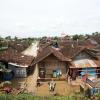
IIASA demographer Raya Muttarak is invited to talk about the impacts of human-induced climate change on our lives, livelihoods and wellbeing in a virtual seminar organized by National University of Singapore
Abstract
Australian bushfire in 2020 and severe floods in Western Europe and exceptional heatwaves in North America in summer 2021, to name a few, are examples of extreme events that are found to be attributable to anthropogenic climate change. It is thus evident that the impacts of human-induced climate change on our lives, livelihoods and wellbeing are already being felt. This raises a question whether, in which direction and to what extent climate change also influences demographic processes, through affecting fertility, mortality and migration, the three key demographic outcomes driving population change. While existing studies focus on investigating the physical, social and economic impacts of climate change, it has remained unclear how climate change would affect population trends. This talk aims to present current evidence on the impact of climatic factors on fertility, mortality and migration and explore whether population projections need to account for the climate feedback on demographic processes. To date, none of the existing global population projections account for such climate impact.
Through providing knowledge on current and future population size, distribution and composition, demography has significantly contributed to the identification of vulnerable populations and their locations. Demographic analysis which focuses on differential vulnerability allows pinpointing of who is vulnerable, where he/she lives and to what climatic hazards. The empirical results obtained coupled with multidimensional population projections enable forecasting of future vulnerability which is particularly useful for policy planning.
For more information and registration please visit the organizer's website.
Biosketch
Raya Muttarak was the Director of the Population and Just Societies Program at the International Institute for Applied Systems Analysis (IIASA) in 2021. She is also Director of Population, Environment and Sustainable Development at the Wittgenstein Centre for Demography and Global Human Capital (IIASA, OeAW, University of Vienna) based in Austria and has recently joined the Department of Statistical Sciences, the University of Bologna as a professor in demography and social statistics. In 2018-2020, she was a chair of the Population-Environment Research Network of the IUSSP. Her research interest is in the field of population, environment and sustainable development with a focus on differential vulnerability, adaptive capacity, human impact on the environment, migration and forecasting future demographic and socioeconomic trajectories.
Upcoming Events
Austrian Academy of Sciences, Dr. Ignaz-Seipel-Platz 2, 1010 Vienna
